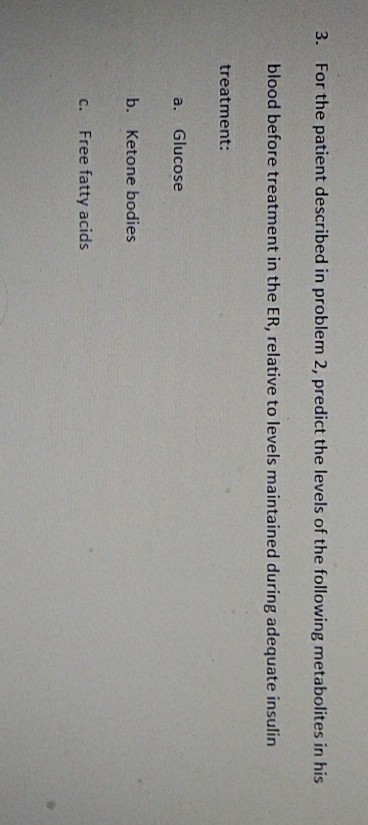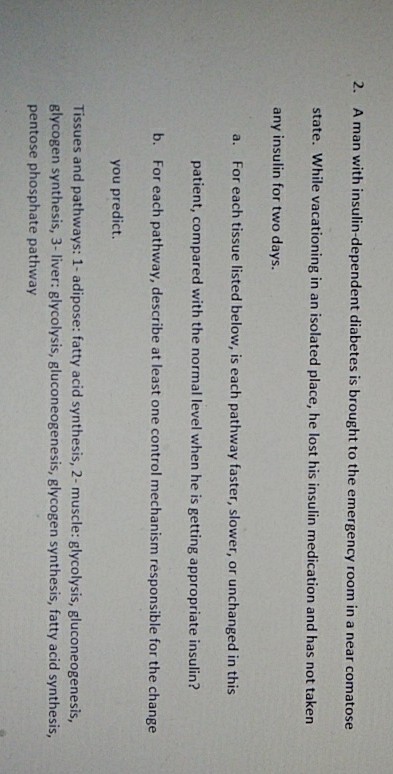or the patient described in problem 2, predict the levels of the following metabolites in his ood before treatment in the ER, relative to levels maintained during adequate insulin eatment: a. Glucose b. Ketone bodies C. Free fatty acids
or the patient described in problem 2, predict the levels of the following metabolites in his ood before treatment in the ER, relative to levels maintained during adequate insulin eatment: a. Glucose b. Ketone bodies C. Free fatty acids
Chapter21: Carbohydrate- Controlled Diets For Diabetes Mellitus
Section: Chapter Questions
Problem 8SC
Related questions
Question
There is two images, question 2 is the case study and I need the answer for question 3.

Transcribed Image Text:3. For the patient described in problem 2, predict the levels of the following metabolites in his
blood before treatment in the ER, relative to levels maintained during adequate insulin
treatment:
a.
Glucose
b. Ketone bodies
C.
Free fatty acids

Transcribed Image Text:2. A man with insulin-dependent diabetes is brought to the emergency room in a near comatose
state. While vacationing in an isolated place, he lost his insulin medication and has not taken
any insulin for two days.
For each tissue listed below, is each pathway faster, slower, or unchanged in this
a.
patient, compared with the normal level when he is getting appropriate insulin?
b. For each pathway, describe at least one control mechanism résponsible for the change
you predict.
Tissues and pathways: 1- adipose: fatty acid synthesis, 2- muscle: glycolysis, gluconeogenesis,
glycogen synthesis, 3- liver: glycolysis, gluconeogenesis, glycogen synthesis, fatty acid synthesis,
pentose phosphate pathway
Expert Solution
This question has been solved!
Explore an expertly crafted, step-by-step solution for a thorough understanding of key concepts.
This is a popular solution!
Trending now
This is a popular solution!
Step by step
Solved in 2 steps

Knowledge Booster
Learn more about
Need a deep-dive on the concept behind this application? Look no further. Learn more about this topic, biochemistry and related others by exploring similar questions and additional content below.Recommended textbooks for you


Human Biology (MindTap Course List)
Biology
ISBN:
9781305112100
Author:
Cecie Starr, Beverly McMillan
Publisher:
Cengage Learning

Biology: The Dynamic Science (MindTap Course List)
Biology
ISBN:
9781305389892
Author:
Peter J. Russell, Paul E. Hertz, Beverly McMillan
Publisher:
Cengage Learning


Human Biology (MindTap Course List)
Biology
ISBN:
9781305112100
Author:
Cecie Starr, Beverly McMillan
Publisher:
Cengage Learning

Biology: The Dynamic Science (MindTap Course List)
Biology
ISBN:
9781305389892
Author:
Peter J. Russell, Paul E. Hertz, Beverly McMillan
Publisher:
Cengage Learning

Biology 2e
Biology
ISBN:
9781947172517
Author:
Matthew Douglas, Jung Choi, Mary Ann Clark
Publisher:
OpenStax

Biology (MindTap Course List)
Biology
ISBN:
9781337392938
Author:
Eldra Solomon, Charles Martin, Diana W. Martin, Linda R. Berg
Publisher:
Cengage Learning

Essentials of Pharmacology for Health Professions
Nursing
ISBN:
9781305441620
Author:
WOODROW
Publisher:
Cengage